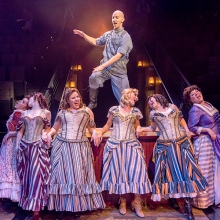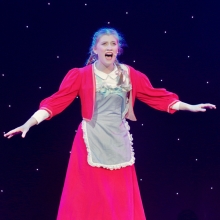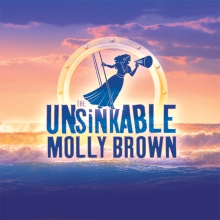
Full Synopsis
Act One
After the overture, a voice not unlike God's speaks in the darkness. The Voice tells the audience that a leading character in this tale is a sum of money – 87 million, 472 thousand, 33 dollars and 61 cents, to be exact. This sum of money catches the attention of a young lawyer named Norman Mushari. Lights come up on Mushari's first day at a prestigious law firm, where his boss, Mr. McAllister, hands him the files of the firm's largest clients. Mushari notices the Rosewater file; after all, theirs is the fourteenth-largest family fortune in America as the proprietors of the Rosewater Foundation. McAllister notes that the presidency of the Foundation is inherited in the same manner as the British Crown; a President holds the office for life and passes it to his heirs, unless he is proven legally insane. With the amount of money controlled by the Foundation in mind, the wheels in Mushari's head begin to spin.
At the Rosewater Foundation, artists line up, waiting for Mr. Rosewater to arrive and hear their grant appeals ("The Rosewater Foundation"). Eliot Rosewater arrives carrying stacks of paperback books. The staff and waiting artists applaud his support of the arts. Eliot has just bought 25 copies of every novel that science fiction writer, Kilgore Trout, has ever written. Although Mr. Trout is little known (and little sold), Eliot is a devotee of his work. He finds the work brilliant; for example, one story is about a society in which death is voluntary, and, in this world, there are ethical suicide parlors set up next to Howard Johnson restaurants. Eliot considers Trout to be a genius.
His secretary, Blanche, ushers in the first applicant, a poet named Mr. Ulm. Although Eliot is not a fan of poetry, he gives Ulm fifty thousand dollars (rather than the ten thousand Ulm requested) so that he can go write the truth. Ulm is flabbergasted and offers to write whatever Eliot prefers, but Eliot tells him to pick the subject... recommending oxygen and combustion as a topic if Ulm gets stuck.
Just then, Sylvia, Eliot's wife, arrives, anxious to hear about his conversation with the psychiatrist that morning. Eliot says that he is done with his treatment, but Sylvia points out that she spoke with the psychiatrist, and he actually said that Eliot is untreatable – not the same thing as being cured. Sylvia is quite disappointed, as she had thought Eliot was improving and was excited about their plans to go the Met opening that evening. Eliot tells her that they will still go. When they get there, however, he confuses the action in the opera for reality and rushes the stage. He disappears after this escapade, and Sylvia goes to the office of Senator Rosewater, Eliot's father.
Senator Rosewater and Sylvia discuss Eliot's whereabouts: he sent a letter from the volunteer fire department in Elsinore, California. He developed "a thing" about volunteer firemen after he accidentally killed three in the war, thinking that they were SS troops. Now in Elsinore, Eliot fancies himself like Hamlet, but with less of a clear purpose. In his letter, he addresses Sylvia as Ophelia and explains that he is searching for something that he must find on his own. He asks her to understand ("Dear Ophelia").
Eliot arrives at a volunteer fire house in Vashti, Texas, where the firefighters are playing cards, drinking beer and generally enjoying an excuse to be away from their wives ("Volunteer Fire Brigade"). Their particular brigade doesn't see much action. Eliot brings them pizza and starts expounding on the dangers of oxygen waiting to combust. The firemen are unsure whether to take the pizza from a crazy person, but decide to go with it ("Volunteer Fire Brigade II"). Suddenly, a call comes in – the Elks Hall is on fire. Eliot watches in wonder as the firefighters dress and take off.
Back in New York, Senator Rosewater confers with his head lawyer, McAllister. McAllister and Mushari have been keeping any eye on Eliot's whereabouts; he has been visiting many other Volunteer Firehouses since Texas. He also went to a science fiction convention, where he made a scene by trying to get attention for Kilgore Trout. He offers to write everyone at the convention a check for five hundred dollars and is dragged offstage, shouting. The wheels that have been turning in Mushari's head click into place. Eliot is clearly insane, and that means that, if there is someone else eligible to receive his inheritance, Mushari can take a sizable commission for arranging that transaction. He just needs to find the right family member ("Mushari's Waltz").
In a Wisconsin bar, Eliot has a revelation of his own. He realizes that he needs to go back to his hometown, Rosewater, Indiana (named for his family, of course). Although he hasn't spent much time there, it's the only place that has ever felt like home. He calls Sylvia, and she begs him to tell her where he is. He gives her a cryptic answer: he is somewhere where people are so plain helpless, they can't leave; these are the people he intends to help. America has abandoned them, not needing them for war anymore, and he is going to love them, even though they are useless and unattractive ("Thirty Miles from the Banks of the Ohio / Look Who's Here"). The citizens of Rosewater are excited to see him.
Senator Rosewater is convinced that Eliot's crazy plan comes from drinking too much, but McAllister says that the son really hasn't been drinking. Senator Rosewater is concerned that Eliot is the end of the family line; the only other Rosewaters are in insurance in Rhode Island. Mushari is particularly interested in this branch of the family. In Rosewater, Indiana, Sylvia is putting the finishing touches on an elegant spread of food for the people that Eliot wants to help. Diana Moon Glampers, a local who works for the Rosewaters but lack's Sylvia's refined tastes, attempts to help her. Eliot is very enthusiastic about the new situation in Rosewater, but Sylvia is having a hard time relating. When the guests arrive, they snub her fancy fare in favor of cheese crackers. This action pushes her over the edge and she has a breakdown ("Cheese Nips"). The Voice Not Unlike God's reveals: later that night, Sylvia attempted to burn down the Rosewater Township Volunteer Fire House and was committed to a private mental hospital.
Eliot speaks with the psychiatrist whom he wishes to see Sylvia. The psychiatrist informs Eliot that he will be keeping Sylvia away from him, that she has a textbook case of Samaritrophia – hysterical indifference to the troubles of those less fortunate that oneself. She needs to be kept away from all philanthropic activity and she takes a trip to Europe. Seeing Eliot, however, would be the worst thing for her. Mary Moody, one of the residents of Rosewater County who has already had a set of twins out of wedlock and is expecting another set, asks Eliot if he is leaving to join his wife. "Never," he replies. He's setting up a branch of the Rosewater Foundation in Roswater, Indiana. He's going to have two telephones – a red one for people who are considering suicide, and a black one just to talk. He sets up an office that is a curious mixture of social work office and Salvation Army outpost ("Rosewater Foundation – Reprise"). His first call comes from Diana Moon Glampers, who is being harassed by the electric company and is dealing with health issues (real and imagined). Eliot talks her through her problems and calms her down. Diana, Mary and the rest of the residents of Rosewater sing Eliot's praises and note the improvements in their lives since Eliot's arrival. Meanwhile, Mushari makes a phone call to Rhode Island ("Since You Came to This Town / God Bless You, Mr. Rosewater").
Act Two
After confirming Fred Rosewater's existence, Mushari heads to Rhode Island. Fred, it turns out, is klutzy and incompetent. His wife, Caroline, is clearly disappointed in him, and they are struggling for money. Basically, their lives are not great, and they could use a big inheritance ("The Rhode Island Tango").
Back in Manhattan, Sylvia and the Senator are in McAllister's office. She explains that she is back in the States after her trip to Paris because her doctor has recommended that she get a divorce. Meanwhile, Eliot and Charley are in Rosewater County, dressed in firefighting gear; they have just been putting out a blaze. Eliot tries to give Charley money, but he refuses. Eliot asks Charley to mail another letter to Sylvia for him on his way out. He has been writing her hundreds of letters, but they have gone unanswered. Eliot's phone rings, and it's a man responding to his ad in a telephone booth – instructing people not to kill themselves, but to call him instead. He encourages the man to come in to the Foundation.
Next, Senator Rosewater calls Eliot. The Senator is displeased with Eliot's behavior, feeling as though he is letting the family down. Senator Rosewater informs Eliot that Sylvia wants a divorce, and puts her on the phone. They have a stilted, but tender, phone conversation. and he convinces her to meet him in Indianapolis later that month for one last farewell ("Eliot... Sylvia"). She asks him to sign the divorce papers when they meet. The Senator asks McAllister to draw up the papers, and he responds that he'll assign the job to Mushari. McAllister makes the call, but Mushari is missing.
In Rhode Island, Mushari explains to Fred and Caroline that their Indiana relatives are swindling them out of a very large fortune, which is their birthright. However, with his help (and for a cut), they can claim their fortune; after all, they are hardworking, normal people... unlike Eliot, the wealthy lunatic ("Plain Clean Average Americans"). Meanwhile, Eliot continues to help the people of Rosewater County in his somewhat effective, if odd, way. Mushari brings the story of the Rhode Island Rosewaters to the press, trying to get other regular Americans to support Frank and Caroline's cause.
The day arrives upon which Eliot is meant to meet Sylvia in Indianapolis. Delbert tells Eliot that he had a dream that Eliot was meant to leave and never come back. Eliot is about to protest when Senator Rosewater arrives; he is rude to Delbert, who leaves. The Senator tells Eliot about Mushari's plan to give the family fortune to the Rhode Island Rosewaters, based on Eliot's alleged insanity. Senator Rosewater accuses Eliot of being a communist, and Eliot counters that he is merely concerned for the citizens of Rosewater County and the rest of the American populace who were not born on the banks of "The Great Money River" the way that he was. The Senator has had enough. He demands that Eliot pull himself together, take the limousine to meet Sylvia in Indianapolis and never return to Rosewater County. Eliot says that he will go but insists that he must take the bus like a regular person. He is reminded of a Kilgore Trout novel in which an alien tells an innocent young astronaut that the Milky Way has been destroyed. Indeed, Eliot feels that the world is ending.
Eliot gets on the bus to Indianapolis as the citizens of Rosewater watch him go. As Eliot looks out over the countryside, he remembers the family history that brought the Rosewaters to Indiana and then ends up reliving his experience in Germany, where he mistook the volunteer fireman for SS troops. One of the people he killed was a fourteen-year-old boy. His commitment to helping volunteer fire fighters clearly stems from the guilt and PTSD from which he suffers over this incident ("Firestorm Consuming Indianapolis"). He tells the bus driver to stop the bus.
A year later, Mushari addresses the audience, making his case for Eliot's insanity. Sylvia, meanwhile, is seen in a nunnery ("Dear Ophelia – Reprise"). We return to Eliot, who is sitting in a mental facility with the psychiatrist, Senator Rosewater, McAllister and Kilgore Trout. It is the day before Eliot has to prove his sanity in court, and the Senator has brought Kilgore Trout to try to convince Eliot to say the right things to appear sane. Trout believes Eliot to be a genius because Eliot gives respect to people, whether or not they deserve it. Trout suggests that giving respect to people in need is just as important as giving food to the hungry. Senator Rosewater believes that, by comparison to Trout, Eliot will appear as sane as anyone else when they go to court. Nevertheless, Senator Rosewater still bemoans that Eliot never had children. McAllister points out that there are nearly 57 people who are claiming that Eliot is the father of their children. This is thanks to Mushari's scheming, as he thought several illegitimate children would make Eliot look even worse to the court. The scheme backfired, however; now that enough people are claiming that their children are Eliot's, it can't possibly be true.
Suddenly, Eliot has an idea. He decides to legally acknowledge all 57 of the children ("I, Eliot Rosewater"). By doing this, he makes it so that the Rhode Island Rosewaters will have no claim to the fortune (as Eliot's children are ahead of them in line) and will be forced to drop their suit. Meanwhile, the children will know that they are loved by their father, something Eliot proudly proclaims when he returns to Rosewater County.
Show History
Inspiration
God Bless You, Mr. Rosewater is based on Kurt Vonnegut, Jr.'s, 1965 novel of the same name. Alan Menken and Howard Ashman adapted the novel into a musical in 1979.
Productions
God Bless You, Mr. Rosewater debuted at the WPA Theater, where bookwriter and lyricist, Howard Ashman, was the artistic director. In May of 1979. Ashman directed the production, which moved to the Entermedia Theater later that year, where it ran for 49 performances from October 14, to November 24, 1979. The opening night cast featured David Christmas, Frederick Coffin, Alan David-Little, Anne DeSalvo, Pierre Epstein, Jonathan Hadary, Will Hussung, Judy Sabo, Marianne Sanazaro, Elizabeth Moore, Peter J. Saputo, Janie Sell, John Towey, Ed VanNuys and Holly Villaire. David Friedman was the musical director and Mary Kyte did the musical staging.
Ashman directed a well-received revival of the show at Arena Stage in Washington, D.C., in 1981.
In 2003, God Bless You, Mr. Rosewater returned to New York in a concert version that was staged as part of the CooperArts series at Cooper Union. Carolee Carmello and Jim Walton starred.
Cultural Influence
- God Bless You, Mr. Rosewater was the initial collaboration between Alan Menken and Howard Ashman, who then went on to write many classic songs and shows, including Disney's The Little Mermaid.
- Kurt Vonnegut, Jr., author of the novel, God Bless You, Mr. Rosewater, is a well-known and influential American author. When he died, The New York Times referred to him as the "counterculture's novelist."
- Although the novel was written in the 1960s, and the musical in the 1970s, the themes are extremely contemporary. The issues of greed and wealth inequality are ever-present in modern American discourse, and these themes are reflected in the musical.
Trivia
- Kurt Vonnegut ,Jr.'s, daughter, Edith Vonnegut, was the producer of the Entermedia production in 1979.
- Like many other noteworthy musical theatre writing teams, Alan Menken and Howard Ashman were introduced by Lehman Engel, founder of the BMI Musical Theatre Workshop.
- Although no official cast recording was ever made of God Bless You, Mr. Rosewater, some original demos of Ashman singing songs from the show can be found online.
- Kilgore Trout, the science fiction writer whomt the character of Eliot Rosewater loves, is Vonnegut's alter ego.
Critical Reaction
"For the deprived theatergoer, it seems absolutely eleemysonary."
– Mel Gussow, "The New York Times"
"Weird and wonderful fun."
– Associated Press
"It is beyond bold for the Coyote Theater to resuscitate the musical; it's downright inspired. A swell show...."
– Alan Klein, "The New York Times"
Billing
- Book and Lyrics by
- Music by
- Additional Lyrics by
- Originally Presented by
- Originally Directed by
Requirements
|
Book and Lyrics by
HOWARD ASHMAN
(50%)
|
Music by
ALAN MENKEN
(50%)
|
Additional Lyrics by
DENNIS GREEN
(50%)
|
Video Warning
In accordance with the Performance License, you MUST include the following warning in all programs and in a pre-show announcement:ANY VIDEO AND/OR AUDIO RECORDING OF THIS PRODUCTION IS STRICTLY PROHIBITED.
Included Materials
| Item | Quantity Included |
|---|---|
| LIBRETTO/VOCAL BOOK | 18 |
| PIANO CONDUCTOR'S SCORE | 2 |
Production Resources
| Resource |
|---|
| HOW DOES THE SHOW GO ON-10/CS |
| HOW DOES THE SHOW GO ON? |
| KEYBOARDTEK |
| LOGO PACK |
| LOGO PACK DIGITAL |
| PRODUCTIONPRO-DIGITAL SCRIPT/SCORE |
| REFERENCE RECORDING |
| STAGE WRITE APPLICATION |
STANDARD ORCHESTRATION
| Instrumentation | Doubling |
|---|---|
| BASS | |
| DRUMS | |
| GUITAR | |
| KEYBOARD 2 |




